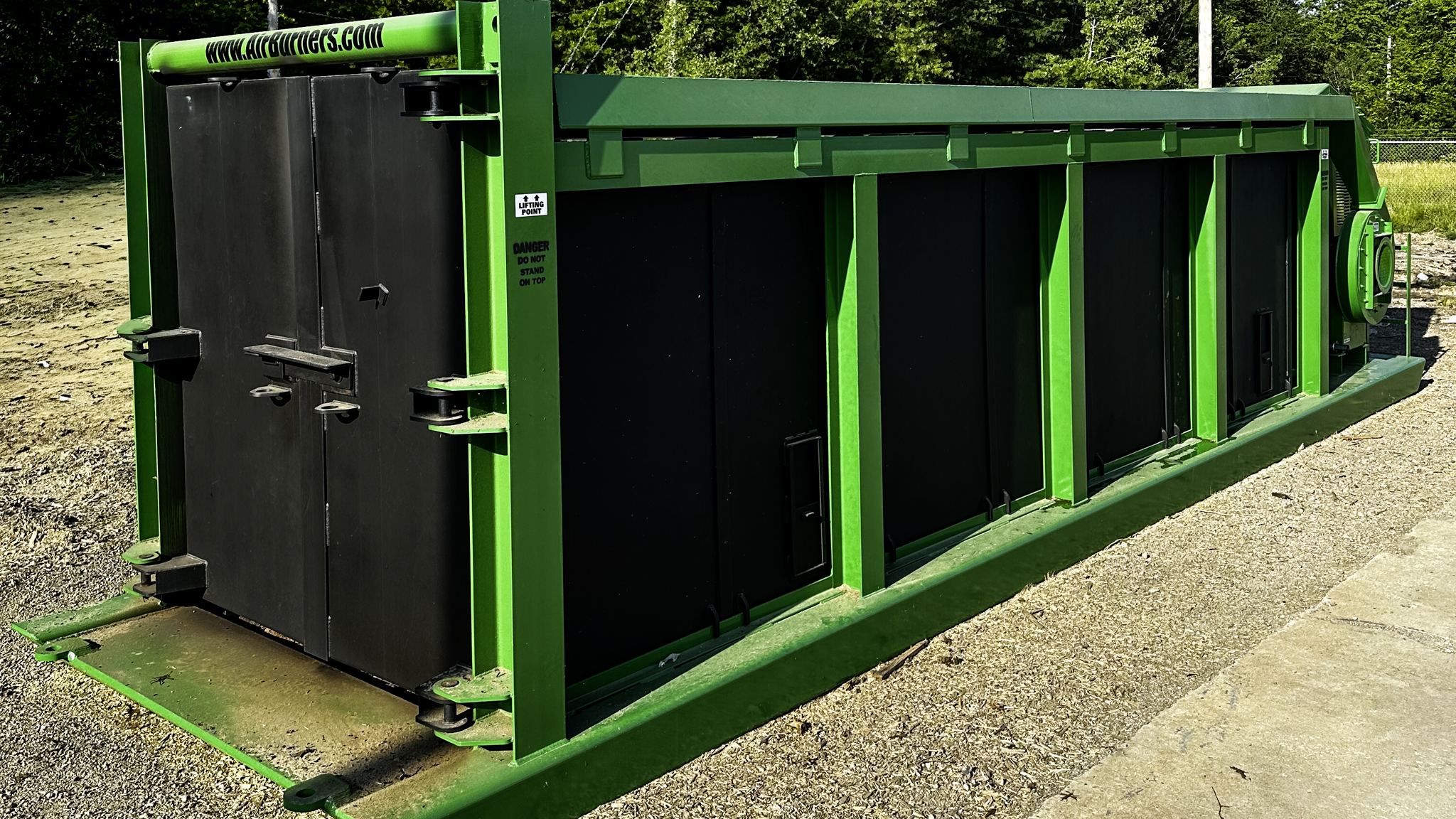Air Burner

Air Burner Technology for Sustainable Wood Waste Reduction
The Air Burner is an advanced solution for eliminating biomass and wood waste while protecting the environment. Using Air Curtain Burner technology, this Industrial Wood Burner reduces harmful emissions, produces valuable biochar and offers a cost-effective, sustainable alternative to landfilling or open burning.
How the Air Burner Works
The Air Burner uses a high-velocity “air curtain” to trap smoke particles and reburn them, cutting emissions to meet U.S. EPA standards. Capable of reducing wood waste by 95–98%, each unit processes seven to nine tons of clean, unpainted wood per hour. The process also produces nutrient-rich biochar, a powerful soil additive that improves water retention, enhances fertility and reduces erosion.
Why Choose an Air Curtain Burner
Unlike open burning or landfill disposal, the Air Burner lowers transportation costs, prevents methane release and supports sustainability goals. Biochar created in the process benefits agriculture, landscaping and erosion control by filtering pollutants, storing carbon and improving long-term soil health.
Packaging Challenges? No Problem.
- Under-engineering that leads to load failure and product damage
- Safety risks that create downtime and high employee turnover
Instead, we deliver a just-right service solution—grounded in packaging science and supported by heat treatment, returnable packaging management, sustainability programs and recycling services—balanced for performance, cost and ease of operation.
Why Choose Millwood as Your Solution Provider?
-
Customer Centric Approach: We collaborate closely with customers, providing personal service and responsive support to meet your unique needs.
-
Industry Expertise Since 1985: With over four decades of experience, Millwood understands the complexities of pallet design and supply chain logistics.
- Innovative Design & Testing: Our in house ISTA certified lab and Pallet Design System (PDS) enable tailored, optimized pallet solutions.
- Manufacturing Experts: From sawmilling, resawing, assembly, heat treating and mold prevention, we have the experience and knowledge to serve you.
-
Sustainability Commitment: We are committed to efficiency without compromising our environment.
Frequently Asked Questions
What is an Air Burner and how does it work?
An Air Burner is a machine that disposes of wood and biomass waste efficiently. It creates a high-velocity air curtain over the combustion chamber, trapping smoke and gases to ensure a cleaner, more complete burn.
Air Burners differ significantly from open burning. Instead of releasing heavy smoke into the atmosphere, the air curtain circulates combustion gases back into the firebox, reducing visible smoke and pollutants. This method ensures higher burn efficiency while handling large volumes of debris, such as forestry slash, pallet waste and sawmill offcuts. Air Curtain Burners are commonly deployed in industries like forestry, recycling and land clearing, where quick and eco-friendly wood waste disposal is essential.
How does an Air Burner improve environmental performance?
Air Burners improve environmental performance by reducing smoke, lowering landfill dependence and offering cleaner biomass waste disposal. They provide an eco-friendly alternative to transporting waste off-site or burning it in uncontrolled conditions.
Instead of trucking debris to landfills, which adds costs and emissions, businesses can process wood waste directly on-site with an Air Burner. This significantly reduces transportation-related carbon output while ensuring compliance with environmental regulations. Air Burners also convert waste into a smaller volume of inert ash, which can sometimes be reused in agricultural or soil applications. Adopting Air Burners can demonstrate a company’s commitment to sustainability, efficiency, and environmental responsibility.
What advantages do Air Burners have compared to traditional disposal?
Air Burners offer reduced emissions, faster processing, lower disposal costs and compliance with sustainability standards. They outperform landfilling and open burning by providing a cleaner, more controlled process for biomass waste.
Traditional landfilling requires costly transportation and tipping fees, while open burning creates excessive smoke, pollution and safety risks. Air Burners solve both issues by allowing on-site combustion of wood and biomass with minimal smoke output. This reduces overall disposal costs, improves efficiency and aligns with regulatory and ESG standards. Many companies also highlight reputational benefits: using an industrial wood burner demonstrates responsibility to customers, communities and investors. Over time, Air Burners can provide both financial savings and a stronger sustainability profile.
What is biochar, and why is it valuable?
Biochar is a carbon-rich byproduct of Air Burners that offers environmental and agricultural benefits. It locks carbon into a stable form, reducing emissions while improving soil health and sustainability outcomes.
When Air Burners operate, they create an inert residue of ash and biochar. This byproduct has unique properties: biochar retains nutrients, holds water and improves soil structure, making it highly valuable for agricultural use. From a sustainability perspective, biochar acts as a long-term carbon sink, preventing carbon from re-entering the atmosphere. Businesses that generate biochar through industrial wood burners can demonstrate leadership in ESG reporting by showing how they reduce emissions and repurpose waste. Some companies even create secondary revenue streams by distributing biochar to farmers, municipalities, or environmental restoration projects.
What industries rely on Air Burners for waste management?
Air Burners serve industries as diverse as building materials, 3PL logistics, food & beverage, pharmaceuticals and more. They provide a clean, cost-effective way to manage large volumes of wood waste on-site.
In practice, industries with heavy packaging, pallet usage or forestry byproducts benefit most from Air Burners. Building materials and construction companies use them to dispose of untreated wood scraps safely. 3PL and warehousing operations reduce pallet and crating waste. Food & beverage manufacturers often deal with wood packaging byproducts that require compliant disposal. Pharmaceuticals and chemicals rely on air curtain burners to meet strict environmental standards while avoiding costly landfill fees. Aerospace & defense, plastics/packaging and glass & clay industries also use Air Burners to responsibly handle biomass waste while maintaining ESG goals.

